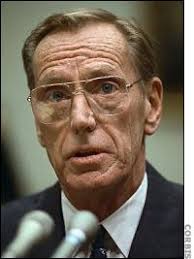Ran Lincoln Savings & Loan, key figure in Savings & Loan scandal
Came to symbolize the $150 billion savings-and-loan crisis a generation ago after fleecing thousands of depositors with regulatory help from a group of United States senators known as the Keating Five. Keating, who pleaded guilty to fraud charges, had been a young man of promise — a Navy flier during World War II, an All-American swimmer in college, the leader of a national campaign against pornography, a blustery Cincinnati lawyer and businessman whose brother was an Ohio Congressman. But in 1984, Mr. Keating, then a 61-year-old Phoenix real estate millionaire, bought Lincoln Savings & Loan, of Irvine, Calif., for $51 million, double its net worth. Lincoln, with 26 branches, made small profits on home loans, but under new state and federal rules it could make riskier investments, and Mr. Keating began pouring depositors’ savings into real estate ventures, stocks, junk bonds and other high-yield flings. In three years, Lincoln’s assets soared from $1 billion to $3.9 billion, and Mr. Keating was using the business as his personal cash machine, taking $34 million for himself and his family and $1.3 million more for political contributions, prosecutors said. Mr. Keating soon called on five senators who had been recipients of his campaign largess — Alan Cranston of California, Donald W. Riegle Jr. of Michigan, John Glenn of Ohio, and Dennis DeConcini and John McCain of Arizona — to pressure the bank board to relax its rules and kill its investigation. Convicted of fraud, racketeering and conspiracy in state and federal trials, Mr. Keating went to prison for four and a half years. Both verdicts were overturned on appeals in 1996. California dropped its case, and on the eve of a federal retrial in 1999, Mr. Keating, who always insisted he had done nothing wrong, pleaded guilty to four counts of wire and bankruptcy fraud and was sentenced to time already served. He joined the Navy in World War II and became a fighter pilot but was never deployed to a combat theater. After the war, he enrolled in law school at the University of Cincinnati, won various collegiate swimming championships and was named an All-American. In 1948, he received a law degree and began practice in Cincinnati. In 1949, he married the former Mary Elaine Fette. They had five daughters and a son. In the 1950s, Mr. Keating organized Catholic men’s groups to fight pornography and founded Citizens for Decent Literature, which under various names grew to 300 chapters and 100,000 members nationally. He became known as a stern moralist, and in 1969 was named by Richard M. Nixon to the President’s Commission on Obscenity and Pornography. With his brother, William, Mr. Keating founded a law firm in 1952. (William was a congressman from 1971 to 1974 and later chairman of The Cincinnati Enquirer.) By the late 1950s, the law firm’s principal client was Carl H. Lindner Jr., a businessman who formed American Financial Corporation in 1960 as a sprawling conglomerate. Mr. Keating left law practice in 1972 to become American Financial’s executive vice president. After a falling out with Mr. Lindner, Mr. Keating moved to Phoenix in 1976 to run American Continental, a real estate spinoff he acquired from American Financial. By the early 1980s, it was a major home builder in Phoenix and Denver.
